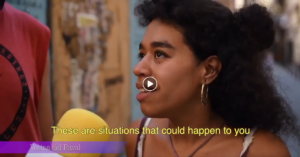By Juan Fernández Ochoa, IDPC Campaigns and Communications Officer
To say the 2020 Support. Don’t Punish Global Day of Action was atypical is quite the understatement. The communities that campaigners mobilise with/from, already targeted by the “war on drugs” and intersecting forms of oppression, are facing serious challenges in the wake of the COVID-19 pandemic. People who use drugs (especially street-based), drug service clients, growers of crops deemed illicit, Black communities, people living in poverty, LGBTQ+ people, sex workers, people in prison and many more bear the brunt of the impact of the pandemic and harmful government responses to it.
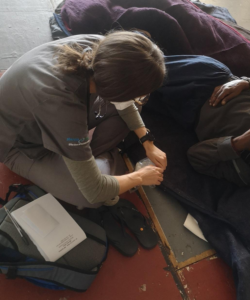
SANPUD and paramedics offered support to street-based people rounded up into camps in Cape Town. Photo: Julie Mac Donnell
The magnitude of the loss and grief could be understandably paralysing. We mourn the over half a million people who have so far lost their lives to this tragedy. We mourn the estimated 585,000 lives lost to drug-related deaths every year. We mourn the many more victims of state violence via “drug control”; the counted and the many more that go uncounted.
We mourn and we also mobilise. Because no life is disposable and we know drug-related harms and deaths are preventable. Our communities have concrete, actionable and [cost-]effective solutions that have gone neglected for too long. In demanding and building much-needed change, we put our grief and rightful anger at the service of the health and welfare of all.
Where the “war on drugs” dispenses marginalisation, punishment and death, Support. Don’t Punish campaigners counteract with empathy, empowerment and solidarity.
This year, more than ever, we have shown this movement is not going anywhere. We’re not willing to leave anyone behind. And that commitment shines bright in the spirit of collaboration, innovation and solidarity deployed by thousands of campaigners in over 190 cities of 85 countries across the globe.
Already in its 8th year, the Support. Don’t Punish campaign’s success is a testament to the power of collaboration. Hundreds of local, regional and international partners have joined this decentralised global effort to build a common front for drug policies that underpin, rather than undermine, human rights. The campaign’s Photo Project, which is about to break the 11,000-photo mark, reminds us of this breadth. We’re powerful together.
In Argentina, our colleagues from Intercambios have fully leveraged the strength of cooperation under the banner #EstarEnLaDistancia, which communicates the importance of being present for those in need despite confinement measures. Over 100 civil society organisations, community networks and health providers coalesced to call on authorities to ensure access to health services during pandemic restrictions. These demands were seconded by a strong and concerted social media campaign that hammered in the importance of ending barriers to services, during and after confinement (asks echoed by EuroNPUD and many more).
In South Africa, SANPUD’s PhotoVoice project made it to the national media! The fruit of a collaboration with Streetscapes, the project will see street-based people who use/d drugs capture and share their experiences through photography. An exhibition is in the cards and the stories will certainly add weight to calls for reform.
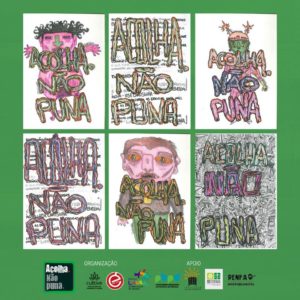
An example of the posters produced as part of the artistic competition organised by a coalition of Brazilian civil society organisations.
Utilising the arts as a means for change is one of the innovations that local partners have taken on decisively during these challenging times. In Brazil, a broad coalition of organisations under the #AcolhaNãoPuna banner organised an arts competition that produced eye-catching flyers that contest coerced treatment and other human rights violations in the name of drug control; they’ll be available for printing and wheat-pasting. In Indonesia, AKSI Keadilan’s Art Speaks Justice competition rewarded submissions that support justice that rejects retribution and punishment.
With over 40 online events, this was also the year of the webinar. Limited access to our habitual stomping grounds in the public space forced our campaigning to go virtual in many cases. Youth-led coalitions took it to the next level, however. The Paradigma Coalition organised the world’s first #SupportDontPunish Decentralized e-Conference, a ‘24/7 virtual room free of stigma and discrimination’ where young people shared experiences of activism from 10 different countries. While the III Support. Don’t Punish Festival put together a 2-week-long programme of almost 40 events that included music, dance and yoga workshops, policy debates and harm reduction panels.
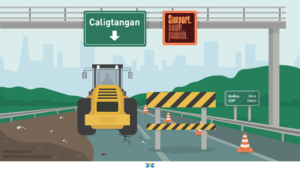
NoBox Philippines is about to launch an online video game focusing on the health and welfare of women.
Honourable mentions in this unending list of overflowing creativity include a hip hop music video shared by community-support organisation AHSUD (Morocco), a social media campaign with religious leaders produced by the India HIV/Aids Alliance, and an upcoming interactive web-based game by NoBox Philippines.
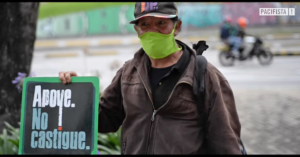
One of the people involved in the activity organised by Acción Técnica Social with street-based people.
The spirit of solidarity that characterises campaigners’ mobilisation has also translated into immediate support for some of the most marginalised in society. In Colombia, ATS organised the distribution of protective equipment, basic supplies and hot meals for street-based people and peers. The activity also provided a platform for street-based people to share their views on the challenges they face, including the lack of access to harm reduction. ‘If people who live in the streets had a safe place to smoke, the reality would be very different’ -said one of the interviewees. Similar activities, focused on ensuring access to protective materials and harm reduction paraphernalia were organised by Paroles Autour de la Santé, in Ivory Coast, and by the Senegalese Association for the Reduction of Infectious Harms (ASRDR).
Reaching out to the community took a different, yet also very powerful, shape in Catalonia. Metzineres, a space of mutual aid and co-creation for/by women and gender nonconforming people surviving violences, organised an open-doors day with the neighbourhood. This video, with English subtitles, summarises the experience of building bonds of solidarity with the local community. A local resident shared they initially felt a bit of fear and prejudice in hearing a space for people who use drugs would open in the neighbourhood, and how this dissipated after spending time together: ‘This space is fantastic for us to get to know each other, to understand each other; it’s fantastic!’.
The obstacles might often seem insurmountable, but our sustained commitment is chipping away at the edifice of the “war on drugs”. Together, we are bringing forward a world where drug-related challenges are not addressed through punishment and imprisonment. Where drug policies actually protect the health and welfare of our communities.
We are energised by and incredibly grateful for this movement’s kindness, courage and resilience 💚
Over the next few weeks, we are deploying a Feedback Form to hear from your experiences, improve mechanisms of support and ensure your incredible efforts are duly captured and shared online.
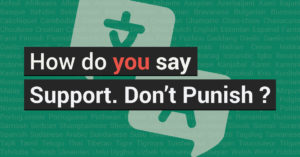 Please, do not hesitate to subscribe to the Support. Don’t Punish newsletter, as the campaign is a year-long effort and we have much in store for the coming months! And do check out this inventory of translations we are building with your support, which already includes our global message in 25 languages!
Please, do not hesitate to subscribe to the Support. Don’t Punish newsletter, as the campaign is a year-long effort and we have much in store for the coming months! And do check out this inventory of translations we are building with your support, which already includes our global message in 25 languages!
As always, you can also find us via our social media accounts (Facebook, Twitter, Instagram, Slack) and get in touch on email.
#SupportDontPunish!
